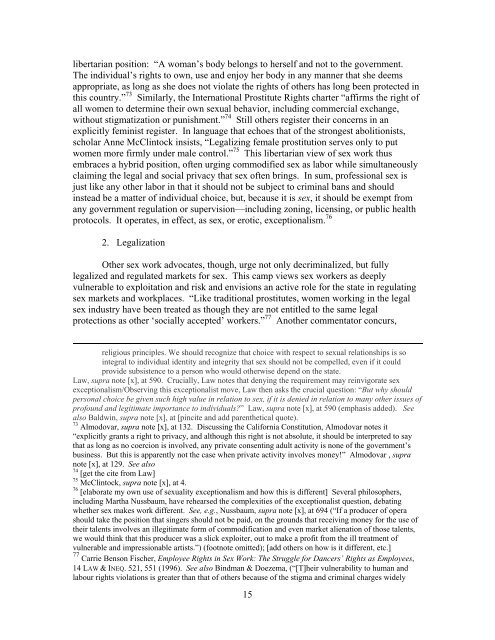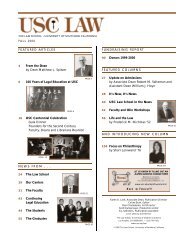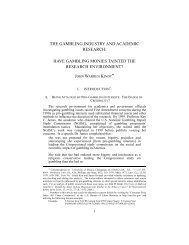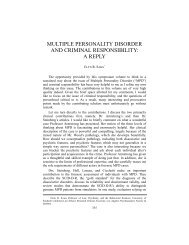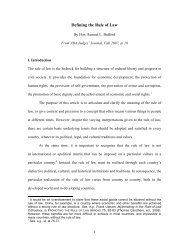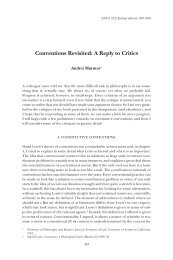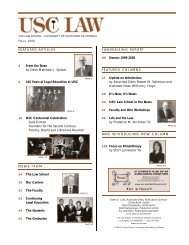1 Regulating Sex Work Adrienne D. Davis VERY ROUGH DRAFT ...
1 Regulating Sex Work Adrienne D. Davis VERY ROUGH DRAFT ...
1 Regulating Sex Work Adrienne D. Davis VERY ROUGH DRAFT ...
You also want an ePaper? Increase the reach of your titles
YUMPU automatically turns print PDFs into web optimized ePapers that Google loves.
libertarian position: “A woman’s body belongs to herself and not to the government.<br />
The individual’s rights to own, use and enjoy her body in any manner that she deems<br />
appropriate, as long as she does not violate the rights of others has long been protected in<br />
this country.” 73 Similarly, the International Prostitute Rights charter “affirms the right of<br />
all women to determine their own sexual behavior, including commercial exchange,<br />
without stigmatization or punishment.” 74 Still others register their concerns in an<br />
explicitly feminist register. In language that echoes that of the strongest abolitionists,<br />
scholar Anne McClintock insists, “Legalizing female prostitution serves only to put<br />
women more firmly under male control.” 75 This libertarian view of sex work thus<br />
embraces a hybrid position, often urging commodified sex as labor while simultaneously<br />
claiming the legal and social privacy that sex often brings. In sum, professional sex is<br />
just like any other labor in that it should not be subject to criminal bans and should<br />
instead be a matter of individual choice, but, because it is sex, it should be exempt from<br />
any government regulation or supervision—including zoning, licensing, or public health<br />
protocols. It operates, in effect, as sex, or erotic, exceptionalism. 76<br />
2. Legalization<br />
Other sex work advocates, though, urge not only decriminalized, but fully<br />
legalized and regulated markets for sex. This camp views sex workers as deeply<br />
vulnerable to exploitation and risk and envisions an active role for the state in regulating<br />
sex markets and workplaces. “Like traditional prostitutes, women working in the legal<br />
sex industry have been treated as though they are not entitled to the same legal<br />
protections as other ‘socially accepted’ workers.” 77 Another commentator concurs,<br />
religious principles. We should recognize that choice with respect to sexual relationships is so<br />
integral to individual identity and integrity that sex should not be compelled, even if it could<br />
provide subsistence to a person who would otherwise depend on the state.<br />
Law, supra note [x], at 590. Crucially, Law notes that denying the requirement may reinvigorate sex<br />
exceptionalism/Observing this exceptionalist move, Law then asks the crucial question: “But why should<br />
personal choice be given such high value in relation to sex, if it is denied in relation to many other issues of<br />
profound and legitimate importance to individuals?” Law, supra note [x], at 590 (emphasis added). See<br />
also Baldwin, supra note [x], at [pincite and add parenthetical quote).<br />
73<br />
Almodovar, supra note [x], at 132. Discussing the California Constitution, Almodovar notes it<br />
“explicitly grants a right to privacy, and although this right is not absolute, it should be interpreted to say<br />
that as long as no coercion is involved, any private consenting adult activity is none of the government’s<br />
business. But this is apparently not the case when private activity involves money!” Almodovar , supra<br />
note [x], at 129. See also<br />
74<br />
[get the cite from Law]<br />
75<br />
McClintock, supra note [x], at 4.<br />
76<br />
[elaborate my own use of sexuality exceptionalism and how this is different] Several philosophers,<br />
including Martha Nussbaum, have rehearsed the complexities of the exceptionalist question, debating<br />
whether sex makes work different. See, e.g., Nussbaum, supra note [x], at 694 (“If a producer of opera<br />
should take the position that singers should not be paid, on the grounds that receiving money for the use of<br />
their talents involves an illegitimate form of commodification and even market alienation of those talents,<br />
we would think that this producer was a slick exploiter, out to make a profit from the ill treatment of<br />
vulnerable and impressionable artists.”) (footnote omitted); [add others on how is it different, etc.]<br />
77<br />
Carrie Benson Fischer, Employee Rights in <strong>Sex</strong> <strong>Work</strong>: The Struggle for Dancers’ Rights as Employees,<br />
14 LAW & INEQ. 521, 551 (1996). See also Bindman & Doezema, (“[T]heir vulnerability to human and<br />
labour rights violations is greater than that of others because of the stigma and criminal charges widely<br />
15


